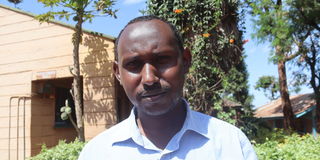Low condom usage blamed for rising HIV/Aids in Marsabit

Saku Sub-county HIV/Aids coordinator Wario Galgallo during an interview at ACK Marsabit grounds. He regretted that the disease prevalence was on the rise in the county.
Low acceptance and use of condoms in Marsabit County is fuelling an increase in HIV/Aids and other sexually transmitted illnesses (STIs).
More than 3,000 people are suspected to have STIs, said Mr Wario Galgallo, the Saku sub-county HIV/Aids coordinator, although only 1,200 cases were reported.
Despite high levels of polygamy, cultural barriers and myths hold people back from testing for STIs and using condoms to stop the transmission of diseases.
Mr Galgallo projected that the total number of infected persons in the county could be above 3,000 compared with only 1,200 who made their status known.
“In Marsabit, we’ve got a very high HIV/Aids stigma index. Even those living with the disease aren’t free to go to hospitals to pick up their antiretroviral drugs (ARVs) for fear of being stigmatised. The utilisation of condoms also remains extremely low,” Mr Galgallo said.
Stakeholders in the county have expressed their concerns over the low acceptability and promotion of condoms due to myths and misconceptions. The infection prevalence stands at 1.2 percent, with at least 2,887 people living with HIV/Aids.
Those living with the disease face discrimination as they are viewed as immoral.
Mr Galgallo explained that much effort was put into sensitising residents to accept that HIV/Aids is not contracted only by promiscuous people.
Self-help groups
Intensive community outreach strategies were put in place by involving Thurandema and Bikiftu self-help groups, whose members were mostly persons living with HIV/Aids.
He was saddened by the region's high stigma, which continued to bar many from going to health centres for ARVs.
He said they were committed to reducing infection rates by 75 percent by 2023.
In Marsabit, Moyale, Sololo, Laisamis and northern towns, few shops stock condoms, and asking about them in some shops is met with condescending responses, suggesting the negative perceptions locals have about condom use.
In one shop in Marsabit town, for instance, a shopkeeper said condoms are slow-moving products and a majority of buyers are non-locals.
In another pharmacy, owned by a non-local, a laboratory technician said that of 10 clients who frequented the facility to buy condoms, only two were locals.
Marsabit Referral Hospital CEO Liban Wako said the low uptake of condoms by locals means sex workers also do not use them. Commercial sex workers say some clients refuse to use condoms even when they know that they are HIV-positive, referring to the condom as ‘an evil object’.
HIV/Aids
Qabale Tache, the chairperson of the Thurandema community-based organization who is also an HIV/Aids activist in Marsabit, said infections could triple by 2025.
She said that as towns in Marsabit grow, more people from other parts of Kenya and Ethiopia are moving to the county.
Many young people, she said, engage in unsafe premarital sex.
She added that because of stigma, those living with HIV in pastoralist communities rarely declare their health status.
Samuel Khaemba, the Food for the Hungry-Kenya health programmes coordinator, raised concerns about low awareness about HIV/Aids screening.
“I was shocked when a 75-year-old chief from Moyale married to three wives revealed that he had never bothered to get tested for HIV/Aids as he had never imagined being infected by the disease,” he said.
He said people in rural areas need to be sensitised about the risks and the need to change sexual behaviour.





